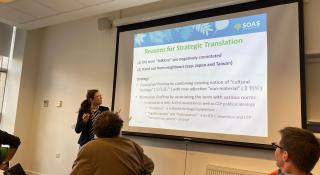
Breadcrumbs navigation
Interspecies cosmopolitanism: Non-human power and the grounds of world order in the Anthropocene
Anthony Burke talks to editor, Martin Coward, about his Review of International Studies (RIS) article. They look at the key arguments, how he came to write on the subject, and what he'll be looking at next.
Cosmopolitanism claims to be the most just and inclusive of mainstream approaches to the ethics and practice of world order, but has largely remained oblivious to the agency, power, and value of non-human life on a turbulent and active Earth. The article develops new grounds and principles for an interspecies cosmopolitanism, exploring how we can reimagine its ontological foundations by creating new grounding images of subjectivity, existential unity, institutional organisation, and ordering purpose.
You can read the full article at: https://doi.org/10.1017/S0260210522000171
BISA members receive access to RIS (and our other journal European Journal of International Security) as a benefit of membership. To gain access log in to your BISA account and scroll down to the 'Membership benefits' section. If you're not yet a member join today.
Full article abstract
Cosmopolitanism claims to be the most just and inclusive of mainstream approaches to the ethics and practice of world order, given its commitment to human interconnection, peace, equality, diversity, and rights, and its concern with the many globalised pathologies that entrench injustice and vulnerability across borders. Yet it has largely remained oblivious to the agency, power, and value of non-human life on a turbulent and active Earth. Without rejecting its commitments to justice for human beings, the article challenges its humanism as both morally and politically inadequate to the situation of the Anthropocene, exemplified by the simultaneous crises of climate change, mass extinction, and the COVID-19 pandemic. In answer, the article develops new grounds and principles for an interspecies cosmopolitanism, exploring how we can reimagine its ontological foundations by creating new grounding images of subjectivity, existential unity, institutional organisation, and ordering purpose. These, in turn, can support political and institutional projects to secure the rights of ecosystems and people to flourish and persist through an increasingly chaotic epoch of human dominance and multispecies vulnerability across the Anthropocene Earth.
Photo by Naja Bertolt Jensen on Unsplash


